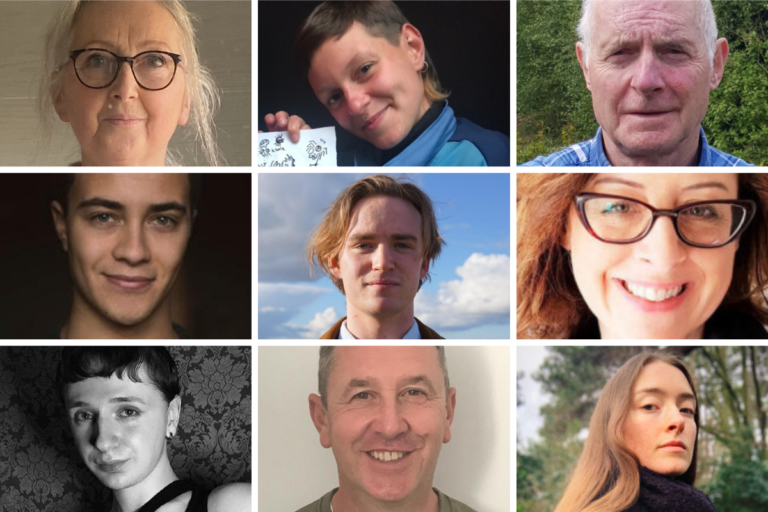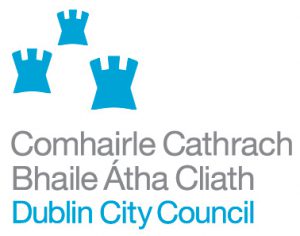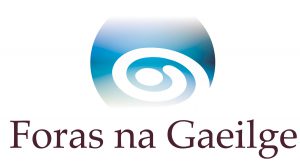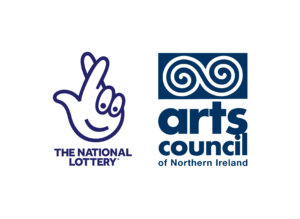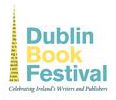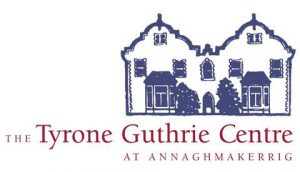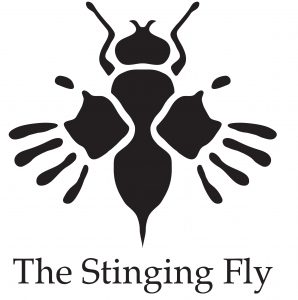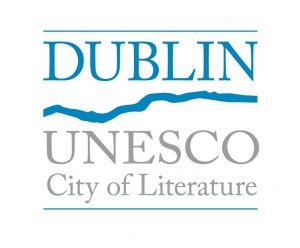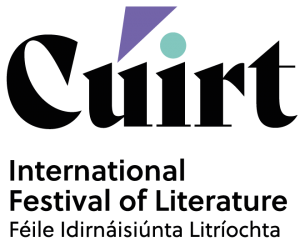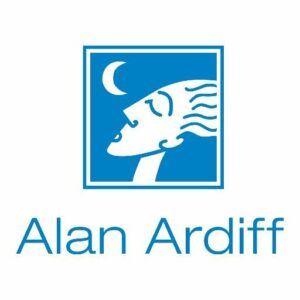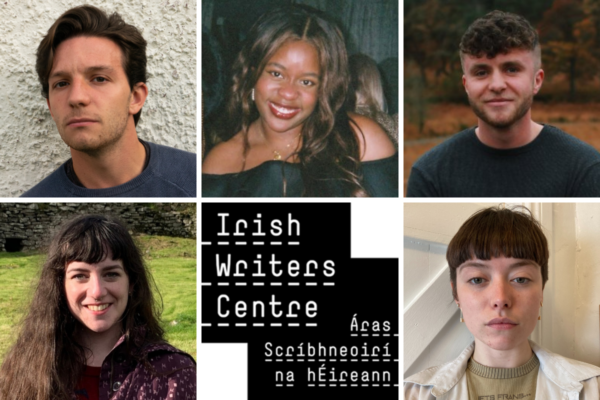
20 April, 2022
Our Young Writer Delegates look back on Cúirt 2022
Earlier this month, writers, readers and book-lovers from far and wide travelled to Galway for the Cúirt International Festival of Literature 2022, and the much anticipated return of in-person events. From 4-10 April, attendees were treated to a week full of readings, conversations, film screenings, walking tours, events and special guests, which showcased new voices, diverse writing, Irish and international writing talent.
Among the attendees were our IWC/Cúirt Young Writer Delegates, William Keohane, Rere Ukponu, Hannah Gallagher, Luca Melis and Ella Gaynor. Here is what they thought of the experience.
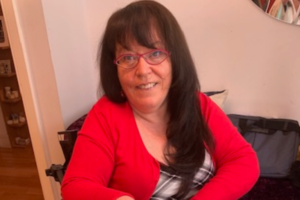
Unsettled: Rosaleen McDonagh
Review by Rere Ukponu
There have been many times where I’ve wanted to disappear, wanted to fit in so well that I faded into the wallpaper. However, during this engaging, poignant and frankly hilarious conversation between icon, author, activist (though she might not call herself one) and all-round cool person Dr. Rosaleen McDonagh and the talented, snazzily dressed, writer and performer Chandrika Narayanan-Mohan – the environment these two women built, was a space so brimming with life, joy, and celebration of otherness- that I felt not only comfortable in my difference, but also grateful for it.
While much of the conversation centred around Rosaleen’s book, it also branched out into discussions of tokenism, activism, friendship, Bridgerton (she preferred season one, over season two), and a gas story of the first time the two women met (an elaborate wine heist). This conversation was an invitation to see disabled people, in their fullness. At the beginning of the talk Rosaleen made the point that disabled women have always had these stories, have always led lush, vibrant lives, they were just not given the platform to talk about it. About the way they felt, thoughts they had, relationships they were in.
But while, Rosaleen, was incredibly open about her life, she also kept some things close to the chest, making the point “As writers we don’t need to overshare, we don’t need to spoon-feed our audience. Women are bright- we understand things even when they’re not on the page”. At this point she looked at Chandrika and they held hands and smiled “We know things” Rosaleen repeated.
There was also an incredibly important point made by both women about tokenism. The belief that you’re only allowed one “diverse” person at a time. If one year you have someone with a disability speaking at an event, the next year you can have a person of colour or a member of the LGBTQIA+ community- and this somehow is diversity. Rosaleen mentioned that it’s all so incremental and individualistic rather than collective, almost like a competition between marginalised people.
Chandrika made a really funny joke about reveling in being the “brown girl of the moment” and wondering who was next to take the crown from her. When she said this, I laughed but it also called to something deep within me, because I understand that fear of only having a limited time to be the “Black girl who writes”, before someone else comes and takes the seat at the table- instead of the people in power just pulling up more chairs!
Rosaleen mentioned that diversity doesn’t just begin at the people being invited to speak, it also includes the people selecting the panel, the arts councils, the grant bestowers- the people making the decisions. There was this story Rosaleen was telling about how she got into protesting. Instead of some seismic realisation that there was injustice in the world that she needed to fix, it was actually just friendship- if she knew she was going to a place she would be welcomed and respected, she would go. And this simple statement, “Friendship is radicalisation” hit me like a ton of bricks. Because that’s it really, when you love people, you want to see them happy, you want to see them safe and cared for and thriving. “You change things, not only with a placard, but by showing up” she said. When you feel safe and seen, you have the strength to fight for things, knowing that at your back you have people to lean on. I got my book signed by the way, it says “To Rere, Nomadic Sisters”, we looked at each other and smiled, and there it was friendship, small and shining.
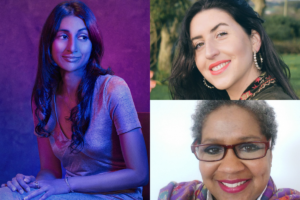
Starting Stanza: Building a Poetry Career
Review by William Keohane
On Tuesday, April 5th, Cúirt hosted a full day of professional development events supporting new and emerging writers. Forging a path as a writer of any genre can be daunting, but poetry, sometimes claimed as the most difficult form of literature, is particularly intimidating. How do you build a career writing poems? How do you make your first steps into the business of poetry? This panel ‘Starting Stanza: Building a Poetry Career’ featuring Sophie L Clarke and Siobhán Ní Dhomhnaill, and moderated by Jess McKinney, provided examples of how poets can forge their way into publishing and the vibrant and diverse poetry scene in Ireland. W. H. Auden said that ‘a poet is, before anything else, a person who is passionately in love with language’. This was the first event that I attended in person at Cúirt, in the more intimate location of the Mick Lally theatre. It became immediately clear to the audience that the three writers on stage were in love with the work that they do.
I did not expect to laugh so much as the trio spoke about the hurdles and triumphs of starting out as a poet; the conversation and the jokes shared between Siobhán, Sophie, and Jess flowed and they discussed their emergence into the world of poetry. As an audience member, it felt something akin to a dinner party we had all been invited to, only instead of food, poetry provided the nourishment. In addition to career advice, we were gifted with readings from both Sophie and Siobhán.
Sophie L Clarke is working towards her first collection, but has performed her work widely, including recently at the Maynooth University Soiree. She defines herself as a wordsmith, and as she read from her work, it was clear that this was undeniably true. Her reading was soft, mesmeric, and made me wish, afterwards, that I could read the words over again. There is no doubt her collection will be a beautiful contribution to Irish poetry when it is released.
Siobhán Ní Dhomhnaill, a bilingual poet, and the author of the Irish language poetry collection Ait agus Iontach Bheith Beo (2021) read from her recent work and shared details about her intentions for her second collection.
Jess McKinney, a poet from Inishowen, Co. Donegal and the author of Weeding, published with Hazel Press in September 2021, and subsequently shortlisted for the Patrick Kavanagh Poetry Award, served as the conversational guide, and brought us through the publishing careers of both Sophie and Siobhán.
In 2019 Siobhán Ní Dhomhnaill won a major prize at Listowel Writers’ Week for her unpublished collection of poems, a bilingual collection which was subsequently published by Coiscéim. She is now working on her next collection. When it comes to developing as a poet, relationships are crucial; for Siobhán, the mentorship she received from Ailbhe Ní Ghearbhuigh proved to be invaluable.
Sophie L Clarke is working towards her first collection. She was one of the poets chosen for the our inaugural cohort of poetry critics under the Diversifying Irish Poetry (DIP) mentorship scheme. DIP aims to establish a sustainable mentorship programme in Ireland for poetry critics from under-represented, minority ethnic groups whose access to critical culture is hindered by structural racism and migration.
It was fascinating to hear about the journeys both poets had been on, and their plans for future collections and career development. A particular moment in the panel discussion, though, caught me off guard. ‘Why publish poetry?’ someone in the audience asked during the Q&A period. Why shouldn’t you keep the words to yourself, especially when they are so personal?
Here, the conversation shifted from questioning how to build a career in poetry, to why? What is the point; is there one at all? The answer, Siobhán and Sophie told us, is that words and representation can be powerful. As an Irish writer, Siobhán feels a certain responsibility to the language, and that she often thinks ‘if I don’t write these poems, who is going to?’
The power of this representation became evident when another Irish language poet, who was in the Mick Lally Theatre room, and who was sitting right behind me, asked a question as Gaelige about her experience as a poet, and the two were able to foster a dialogue in the room.
It was evidence of, not just the importance of Irish poetry as a medium for connection, but also how events like Cúirt can bring people together, and provide a space for writers to share their work aloud, to a room of people with shared interests and aspirations.
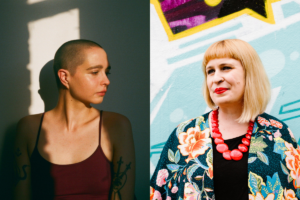
Heroes and Villages with A.K. Blakemore and Jan Carson
Review by Hannah Gallagher
On the Wednesday of Cúirt, I attended ‘Heroes and Villages’ in the Townhall Theatre. A.K. Blakemore and Jan Carson were discussing their novels, The Manningtree Witches and The Raptures. Despite being set in two different time periods, both novels discuss how small towns cope with their dark pasts. The Manningtree Witches is about witch trials in England in the 1640s. The Raptures is set in Northern Ireland in the 1990s, about a mysterious illness striking down children in a small town.
Jan Carson highlighted how Evangelical Protestantism is often not understood or well represented. She discussed the kind of representation she was used to seeing, the pastiches of Protestant culture, where everyone was a paramilitary or a caricature of Ian Paisley. Her book is written from experience, and in the talk she reflected on her own upbringing. She talked about the religious stranglehold there is on these communities and the lack of outside influences. They were encouraged to only socialise inside of their own communities and with people from their own background. Women would often find themselves silenced by their own communities and standing up for yourself was not encouraged. She set out to write something believable and entertaining.
A.K. Blakemore talked about why so many women confessed to being witches, the desperation these people experienced. She talked about the power these people may have felt, imagining that the devil could actually do things for them. Maybe court was the first time these women felt listened to. Using the accused and accusers’ own words in the novel allows the reader to hear how these people expressed themselves, and to see how their own words would be used against them. She talked about the origin of the witch trials, and how it came from the chaos of the English Civil War. In a town, begging was usually the starting point for accusations of witchcraft, and how this would dissolve the solidarity that existed in communities. This reflects the modern tabloid hatred for people on benefits.
It seems to be an appropriate time for both novels to be released, because both deal with a pandemic of kinds, in The Manningtree Witches, there is a pandemic of accusations against people, and in The Raptures, there is a pandemic of mysterious deaths that appears to be the coming of the Rapture.
Jan Carson talked about the sudden interest in women writers from the North, coming from the success of Anna Burns, who won the Booker Prize, and how Brexit has also increased the interest in writing about the border.
After the talk I was very excited to buy both of the books, and reading them has allowed me to reflect on the amazing time that I had at Cúirt. They have encouraged me to think about the high-pressure environment of the small town, and what will encourage people in a community to turn on each other.
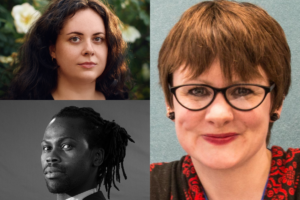
Boom Gone Bust: Dismantling Capitalism
Review by Luca Melis
There are few questions as pervasive and anxiety-inducing in modern society as the ones the three accomplished authors tackled in this panel; Why do we work under such inhospitable conditions? Why do we allow our governments to strip away the rights of our most vulnerable citizens in the name of austerity? Who gets to decide who is a refugee?
In this difficult but essential conversation, writers Amelia Horgan, Ellen Clifford and Bulelani Mfaco sat down in An Taibhdhearc theatre for a discussion on the state of late stage capitalism, and the perilous effects it’s having on our mental and physical wellbeing.
While discussing her book Lost in Work: Escaping Capitalism, Amelia Horgan framed the current neo-liberal economic model the world functions in as an existential threat to our aspirations of stability and comfort. Horgan asserted that the speed of progress under late-stage capitalism is fundamentally at odds with human nature. While labour in the Global North has transitioned to largely service-based industries, the rise of the gig economy has left millions of workers less financially secure than previous generations. This economic structure has also encouraged people to monetise their hobbies and their passions, as a way of validating them. This has had the knock-on effect of further commodifying all aspects of our lives, where society renders the individual a failure for their lack of particiaption. As wages stagnate and living costs surge in developed nations, Horgan wants humanity to develop more equitable forms of organising economies.
Ellen Clifford echoed these anti-capitalist sentiments through her book The War on Disabled People: Capitalism, Welfare and the Making of a Human Catastrophe. Clifford criticised the brutal austerity measures carried out by Britain’s successive Tory governments since 2010, reversing years of progress on disabled people’s rights in the process. These policies created an othering of disabled people in the UK, effectively punishing them for a financial crisis they didn’t create. Clifford informed the crowd that according to the W.H.O, almost 15% of the global population identify as disabled, highlighting the enormous impact of these austerity policies under capitalism. Clifford believes that solidarity and organised resistance is crucial to preventing further damage to disabled people in Britain and beyond.
Bulelani Mfaco’s frankness and clarity often left the audience silent, reflecting on his experiences living in direct provision since 2017. Mfaco and Clifford both reflected on the paternalistic culture that capitalist governments have historically used to treat their most vulnerable citizens. Mfaco scathingly described the older generation’s stereotypes of the starving African child on the Trocaire box as an accidental reinforcement of paternalism, underpinned by neoliberal philosophies of charity over welfare. As well as the dehumanising conditions people in direct provision endure, including regular invasion of privacy by landlords and rigid meal times, Mfaco informed the audience that operators of these systems make over €144,000 per year in profits on each family of four living in these conditions. As he stated frankly, “they are profiting off of our bodies”, at the hands of the Irish government.
The ubiquity of modern capitalism has ironically made it a difficult subject to engage with, as many of us struggle to imagine genuine alternatives to its greed and commodification of life. It is such that conversations like this are essential for the public to hear and reflect on. I was privileged to have attended the event and to have heard the authors speak with passion and clarity that cut through the room. Their writings have become essential readings under late-stage capitalism, and I’m grateful to Cuirt for affording me the opportunity to hear their thoughts.
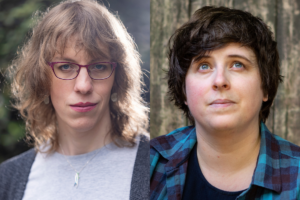
Liars & Dreamers, Harry Josephine Giles and Eley Williams
Review by Ella Gaynor
What I love about Cúirt festival is the chance to learn about new books through discussions with
their authors; it’s not often you’re given the chance to pick someone’s brains on a piece of work.
Cúirt takes this privilege one step further by enabling great authors to pick each other’s brains
before the audience.
It was appropriate that this conversation be held in An Taibhdhearc; Galway city’s Irish language
theatre. Harry Josephine Giles and Eley Williams’ new novels both break down the journey
language makes through its day-to-day use. The two women flexed an impressive knowledge of
historical lexicons and their movements through time.
A reverberation runs through the author’s microphones and Eley Williams jokes ‘Now, as my voice
takes on a kind of Godly resonance’. The resonance of words chosen by authors can indeed be Godly,
the feelings we are left with after a well-written story are undeniable, books leave as much of a
lasting imprint as art. In choosing non-conventional settings for love stories: a space-station, two
split timelines, the authors allowed their fresh vocabularies to lift what may be considered as a
conventional plotline to new heights. In conversation, each author demonstrated an innate
understanding of the power of words, for me their knowledge seemed to verge on the scientific.
Even with the naming of all of the authors’ characters, every syllable held meaning.
Williams discussed the hilarious conception of phrases like ‘Mountweazel’ and ‘trap streets’ (you’ll
have to find out for yourself!). Harry Josephine Giles divulged us on a history (and a present) of
Scottish Isles which I had never been aware of – being an Irishwoman I must admit I felt slightly
ashamed for being completely ignorant to a people with whom I should have a kinship. Giles’
book is written in the Orkney dialect; a language stemming from the Orkney islands, situated off
the Northern Coast of Scotland. In the discussion Giles said she wanted to challenge the unfair
and artificial dynamics concerned with writing in a non-universal language. Her pages were split
70/30, with the story told through Orkney poetry taking up most of the page, and the lower
section composed of an English prose translation. Giles made sure that the English she
constructed was ‘crunchy’, to replicate the way minority languages like Orkney and Gaeilge are
translated from English; the translated editions tend to lose a lot of their original beauty and
flow. Giles wanted to give the minority role to the universal language of English for a change.
Language is a tool to keep fashioning language. In a discussion of words, these two authors left me with
a better understanding of language as art. You would think, especially at a literature festival, that
words couldn’t possibly be explored any further. This conversation disproved that theory. It was
enlightening to see how much further we can travel with language. Giles discussed the absence
of queer vocabulary in the Orkney language, Williams discussed the absence of necessary words
in English’s recent past. The Irish language suffers under similar afflictions, the religious laws are
still evident in a lot of our native vocabulary centred around women and sexuality. The authors
reminded us of the potential for new words, and the fun still to be had in the expansion of a new
vocabulary.


